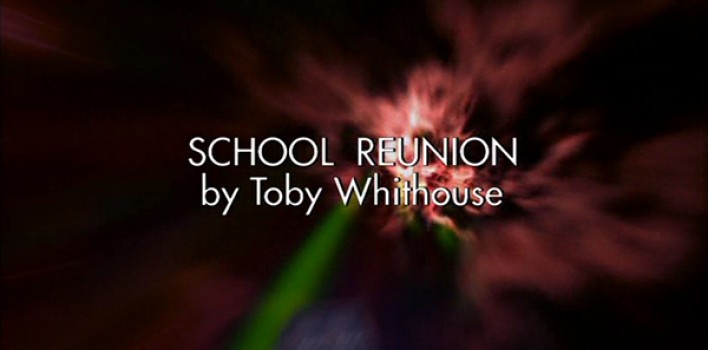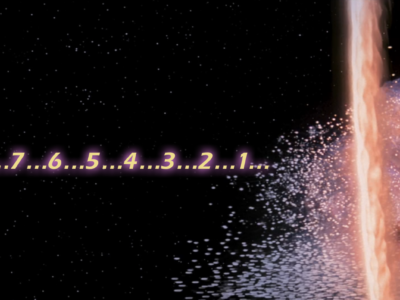Who-ology| S02E03 School Reunion
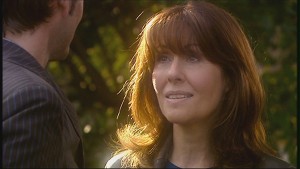 There’s a lot going on in “School Reunion”, but it all adds up to the same thing, best expressed in the episode by a former (quite beloved) TARIDS traveler: companion Sarah Jane Smith, played by the late Elisabeth Sladen. As the Doctor is being tempted by our episode’s villain, she draws him back from the brink, saying:
There’s a lot going on in “School Reunion”, but it all adds up to the same thing, best expressed in the episode by a former (quite beloved) TARIDS traveler: companion Sarah Jane Smith, played by the late Elisabeth Sladen. As the Doctor is being tempted by our episode’s villain, she draws him back from the brink, saying:
“The universe has to move forward. Pain and loss, they define us as much as happiness or love. Whether it’s a world or a relationship, everything has its time. And everything ends.”
We watch over the course of the episode as Sarah Jane herself must reach this conclusion before being able to share it with others. Left behind by the Doctor without so much as a goodbye, she has lived her life waiting for him, wondering what happened to him, and struggling to know how to live in a small corner of a huge world that she no longer has access to. Her conclusion at the end of the episode is very reminiscent of Ecclesiastes: “For everything there is a season, and a time for every matter under heaven” (3:1).
Ecclesiastes has an arguably depressing tone, if taken at face value—essentially “eat, drink, and be merry, for tomorrow we die.” This sentiment alone does not lead to a good end, but to a morbid striving to get what you can at whatever cost because we’re all going to die. There is a lot of this kind of regret, striving, and turmoil in this Who-episode. The aliens causing trouble this time are called Krillitanes. They go about the universe conquering species and taking on their best attributes, whether it be a physical, mental, or spiritual. They spend their lives seeking to enhance and prolong their existence without ceasing–no matter who it hurts. In “School Reunion,” this quest has brought them to a school where, incognito, they are using the inherent creativity of children to solve a mathematical equation that will unlock the secrets of the universe and offer them complete control over time and space.
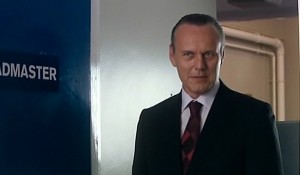 We soon find that our villains and our heroes are motivated in similar ways. That in fact, we are more like the Krillitanes than we might want to admit. Look around. Does it not seem to be the chief end of man to get what he can for himself, preserve his life as long as possible and seek after, obtain, hold onto the good things in life? These things certainly seem to motivate most of the human race in the 21st century, even for religious folk who profess to believing in something larger than the temporary self. Consider the quiet, unexamined motivations that undergird your daily actions. Why did you say that thing, make that choice, feel those fears, invest that time or money? How many of those things spring from the desire to enhance and hold onto a life that will inevitably end in death? How does this motivation affect your behavior towards others in your sphere?
We soon find that our villains and our heroes are motivated in similar ways. That in fact, we are more like the Krillitanes than we might want to admit. Look around. Does it not seem to be the chief end of man to get what he can for himself, preserve his life as long as possible and seek after, obtain, hold onto the good things in life? These things certainly seem to motivate most of the human race in the 21st century, even for religious folk who profess to believing in something larger than the temporary self. Consider the quiet, unexamined motivations that undergird your daily actions. Why did you say that thing, make that choice, feel those fears, invest that time or money? How many of those things spring from the desire to enhance and hold onto a life that will inevitably end in death? How does this motivation affect your behavior towards others in your sphere?
The leader of the Krillitanes—a so-called Mr. Finch—does not so much attack the Doctor physically or mentally, but spiritually. He asks him to join the Krillitanes voluntarily in solving the paradigm, offering to share its ultimate power. He does this by appealing to the Doctor’s desire to undo the biggest regrets of his life. Such is the power of this suggestion on our usually-unshakeable hero that it takes Sarah Jane’s impassioned speech to snap him out of it.
How tempting it is to make this life itself the ultimate thing. I submit that when we do this, we actually leech the joy out of the very life we’re trying to hold onto: We carve out for ourselves an existence ruled by the fear of experiencing the loss and death of these good things. This gives so much power to the good and bad experiences of our life to control us, and ultimately to crush us. For if there is nothing beyond them, what is the point of anything?
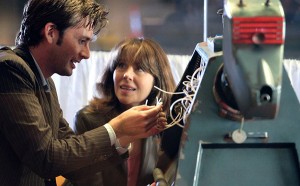 If the theme of Ecclesiastes and “School Reunion,” seems irredeemable, then take heart: though it seems a dark thought, its ultimate end is a bright one. Sarah Jane decides that “some things are worth getting your heart broken for”: she would rather have “loved and lost than never loved at all,” as the Tennyson quote goes.
If the theme of Ecclesiastes and “School Reunion,” seems irredeemable, then take heart: though it seems a dark thought, its ultimate end is a bright one. Sarah Jane decides that “some things are worth getting your heart broken for”: she would rather have “loved and lost than never loved at all,” as the Tennyson quote goes.
Ecclesiastes does one better: while it may highlight the temporal nature of our lives and the things that fill it, it nevertheless offers encouragement to fully enjoy what we have been given in the time it’s been given to us–for though “it” may be passing away, “it” has been given to us as a gift in this moment. Ecclesiastes reminds us that we are visitors in this world. That even the good things we experience are mere reflections, shadows, of what is to come in eternity. And all our striving and toil–all the things we do to avoid the bad in life, getting after the good and making it last as long as possible–will cease. “He has made everything beautiful in its time. Also, he has put eternity into man’s heart, yet so that he cannot find out what God has done from the beginning to the end” (3:11).
Our destiny is an eternity with the True, Ultimate Good. If we can experience the good in our brief lives as reflections of that Thing rather than the thing itself, then we can experience the circumstances of our lives fully and without fear, taking what we can from them and letting them pass as mere steps on our way to a more whole, perfect, and safe eternal existence. We can allow them to inform us and shape us, but not break us. And we will have the freedom to be more open and giving with others if we are not so concerned about protecting ourselves and our own.
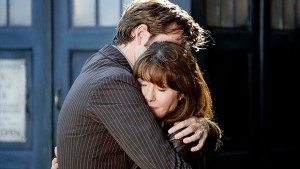 We see the transformation offered by this shift in thinking through Sarah Jane. At the beginning of the episode, we see her living as though her time with the Doctor was the ultimate thing—as if there was no good apart from him. Her life was overshadowed by regret and loss. She is immediately jealous of Rose, his new companion, and they are nasty and petty with each other at first. But by the end of the episode, her demeanor has changed. She softens towards Rose and the Doctor. She is much lighter and freer in the realization that her life has indeed moved on, and that there is much ahead of her, even without him: Her eyes are now open to what those things might be, and she moves forward into the world, empowered by new energy to live fully into her life, making a difference in the world she’s been given.
We see the transformation offered by this shift in thinking through Sarah Jane. At the beginning of the episode, we see her living as though her time with the Doctor was the ultimate thing—as if there was no good apart from him. Her life was overshadowed by regret and loss. She is immediately jealous of Rose, his new companion, and they are nasty and petty with each other at first. But by the end of the episode, her demeanor has changed. She softens towards Rose and the Doctor. She is much lighter and freer in the realization that her life has indeed moved on, and that there is much ahead of her, even without him: Her eyes are now open to what those things might be, and she moves forward into the world, empowered by new energy to live fully into her life, making a difference in the world she’s been given.
We will see her again, and witness the flourishing that this ideological shift has brought her and the world around her. I guarantee it.


